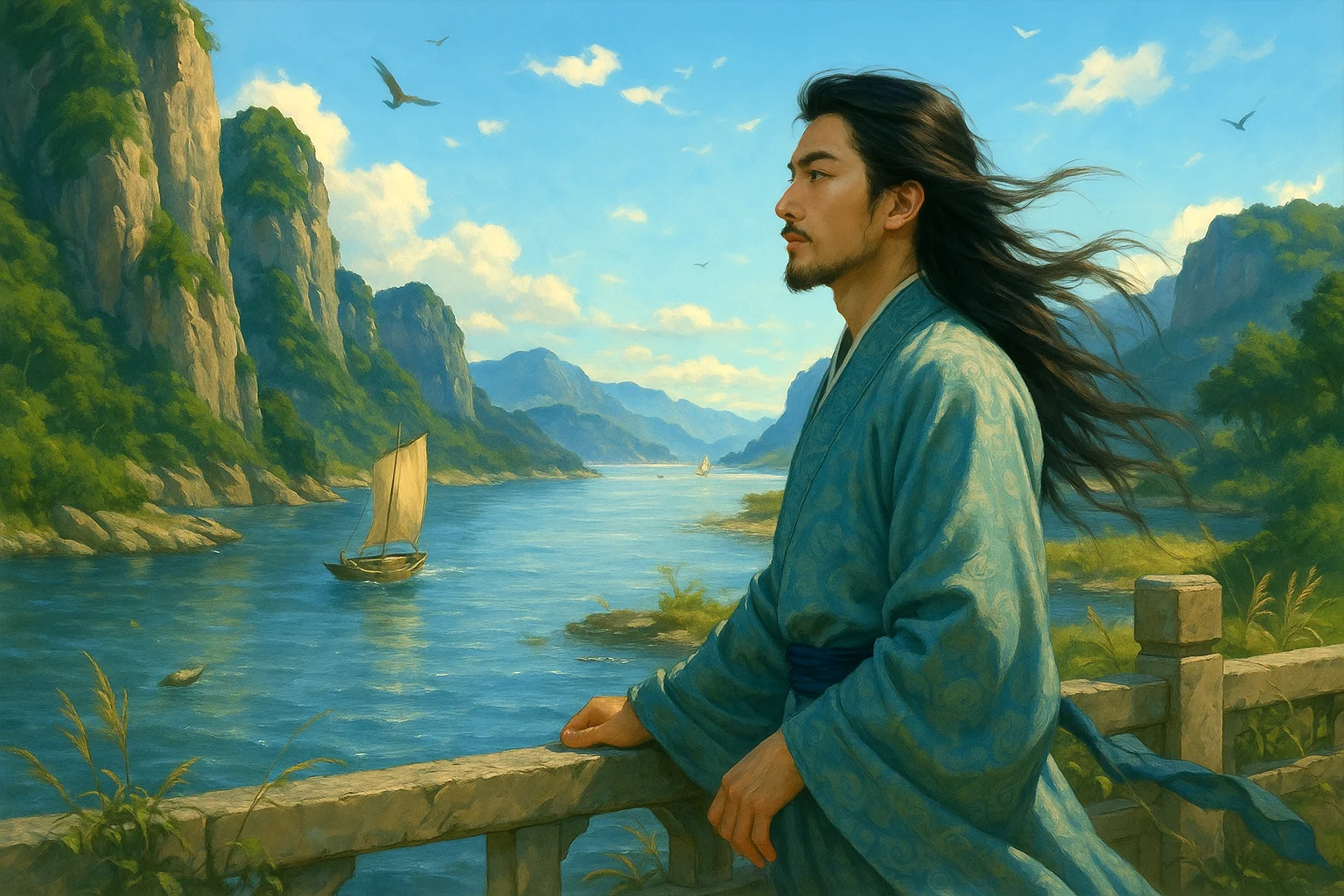Frost-stripped Huai River's grandeur fades,
Only murmurs linger through the glades.
Yet beauties sing the Drunkard's verse—
Forty-three years flashed like the universe.
Dewdrops on grass—pearls that slip,
Full moon wanes to crescent's grip.
Who else recalls that sage with me?
Just West Lake's moon beneath the sea.
Original Poem
「木兰花令 · 次欧公西湖韵」
苏轼
霜馀已失长淮阔,空听潺潺清颖咽。
佳人犹唱醉翁词,四十三年如电抹。
草头秋露流珠滑,三五盈盈还二八。
与余同是识翁人,惟有西湖波底月!
Interpretation
Composed in 1091 upon assuming governorship of Yingzhou—the very region his mentor Ouyang Xiu once administered—this cí represents Su Shi's most profound literary homage. Written in autumnal melancholy during a boat excursion on Yingzhou's West Lake (Ouyang's cherished landscape), the work performs double mourning: for a departed teacher, and for the irretrievable golden age of Song culture they shared.
Upper Stanza: "霜馀已失长淮阔,空听潺潺清颖咽。佳人犹唱醉翁词,四十三年如电抹。"
Shuāng yú yǐ shī cháng Huái kuò, kōng tīng chánchán qīng Yǐng yàn. Jiārén yóu chàng Zuìwēng cí, sìshí sān nián rú diàn mǒ.
Frost has shrunk the mighty Huai—
Now only Ying River's sob
Fills the silence.
Songgirls still chant the Old Drunkard's verses,
Though forty-three years
Have flashed like lightning.
The stanza opens with hydrological elegy: the "mighty Huai" (长淮), once grand under Ouyang's governance, now diminished by autumn's touch. The Ying River's "sob" (咽) personifies both waterway and poet's grief. That Ouyang's drinking songs (醉翁词) outlive their creator underscores art's triumph over mortality—yet the temporal whiplash of "forty-three years/flashed like lightning" (四十三年如电抹) reveals Su Shi's stunned realization of his own impending twilight.
Lower Stanza: "草头秋露流珠滑,三五盈盈还二八。与余同是识翁人,惟有西湖波底月!"
Cǎo tóu qiū lù liú zhū huá, sānwǔ yíngyíng hái èrbā. Yǔ yú tóng shì shí wēng rén, wéiyǒu Xīhú bō dǐ yuè!
Dewdrops slide from grass blades—
Full moon wanes to crescent:
All who knew the old master
Have scattered like mist…
Only West Lake's moon
Remembers in its depths.
Here, nature's ephemera—dewdrops (秋露) and moon phases (三五, 二八)—become metaphors for intellectual lineage's fragility. The devastating revelation that "all who knew the old master have scattered" (与余同是识翁人) isolates Su Shi as last witness to a vanishing era. The final image of the moon preserving Ouyang's memory "in its depths" (波底月) achieves sublime paradox: lunar reflection, itself insubstantial, becomes the most enduring memorial.
Holistic Appreciation
This autumnal elegy, composed during a moonlit boat excursion on West Lake, stands as one of Su Shi's most profoundly moving tributes to his late mentor Ouyang Xiu. Rather than expressing grief directly, the poet masterfully channels emotion through natural imagery—the murmuring Ying River, dew-laden autumn grass, and the moon's reflection in rippling waters—interwoven with cultural symbols ("Drunken Sage's verse," "moon beneath the waves") to create layers of poignant resonance.
Su Shi artfully adopts Ouyang Xiu's signature clarity and classical elegance while infusing the work with his characteristic philosophical depth and restrained passion. The memorial sentiment permeates quietly like evening mist over water—subtle yet all-encompassing, restrained yet profoundly moving. Beyond mourning his mentor, the poem contemplates life's transience and the rarity of true intellectual kinship, reflecting Su Shi's own meditations during his twilight years.
Artistic Merits
- Nature as Emotional Canvas
The "sobbing Ying River," "dew slipping from grass tips," and "submerged moonlight" transform natural elements into vessels of quiet sorrow, achieving what Chinese aesthetics calls "scene-emotion fusion" (情景交融). - Cultural Allusions with Dual Meaning
The numerical reference to the moon's phases (三五…二八) carries classical connotations of life's ephemerality, while "those who knew the old sage" becomes a moving metonym for Ouyang Xiu's enduring legacy. - Symbolic Culmination
The final image of moonlight dancing beneath West Lake's surface serves as both literal description and profound metaphor—suggesting how true mentors continue to illuminate our minds long after their passing.
Insights
This transcendent elegy teaches that genuine remembrance requires neither dramatic lament nor elaborate ceremony. Like moonlight penetrating water, true mentorship continues to guide us across generations. The poem's quiet power reminds us that while human lives are fleeting like autumn dew, the light of wisdom—like the eternal moon—continues to shimmer beneath the surface of our consciousness, offering guidance during life's darkest nights.
About the Poet

Su Shi (苏轼, 1037 - 1101), a native of Meishan in Sichuan, was a polymath of the Northern Song literary world. His prose was expansive and unrestrained, his poetry fresh and vigorous, and his ci poetry pioneered the bold and unconstrained style. In calligraphy, he created the "Su Style," and in painting, he championed "spiritual resonance," earning him a place among the "Four Masters of the Song." Despite repeated political persecutions—most notably the "Poetry Case of the Black Terrace"—his exile to Huangzhou, Huizhou, and Danzhou yielded timeless masterpieces. Lu You praised him as "the literary patriarch of an era."












